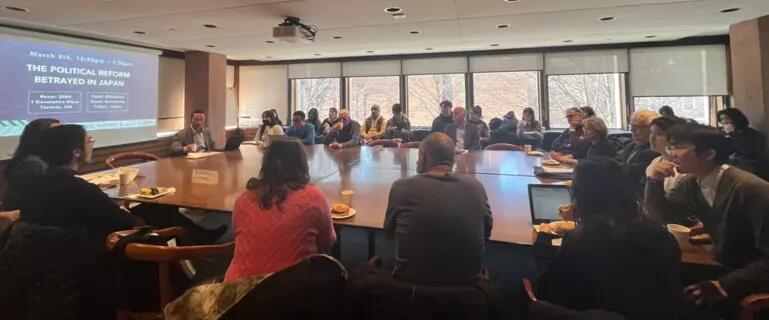
Event Report: The Political Reform Betrayed in Japan
On March 8th, from 12:00 pm to 1:30 pm (EDT), Toshi Shinkawa, a Professor of Political Science at Hosei University in Tokyo, Japan, delivered a presentation about attempts by successive Japanese governments to implement political reforms. The Centre for Global Social Policy co-sponsored this event.
Shinkawa opened his presentation by reviewing historical attempts by Japanese governments to reform the political system, noting that the main goals of the reforms were to “facilitate maturity and openness” in the country. Particularly important were electoral and campaign finance reform that took place in the 1990s. As a result of these reforms, it was thought that a two-party system would emerge.
Shinkawa noted that, “What the Japanese witness today is very different from the outcomes originally expected.” The Liberal Democratic Party still retains power and has even more centralized authority than it had in the past. Shinkawa observed that reform failed to encourage political alliances between opposition parties. The Liberal Democratic Party now exists in an era Shinkawa classified as a “one strong and many weak party system,” rather than a two-party system as originally envisaged.
Shinkawa argued that this failed reform was not accidental. For example, the proportional representation tier in the Lower House, as well as the low threshold for public subsidies, encourages the proliferation of small parties. These features stymie opposition cooperation and sustain LDP dominance. The talk concluded with Shinkawa’s assessment that political reform attempts in Japan have ushered in an era of stagnant politics and futile democracy instead of the revitalization once promised.
A lively question-and-answer period followed the presentation. Shinkawa answered questions about top Liberal Democratic Party leaders, why smaller political parties have been unable to form strong alliances, and how the political opinions of younger Japanese citizens are shifting from historical norms.
We would like to thank Professor Toshi Shinkawa for sharing his insights and for Professor Ito Peng’s moderation, as well as the large audience that was in attendance for an engaged Q&A session.

